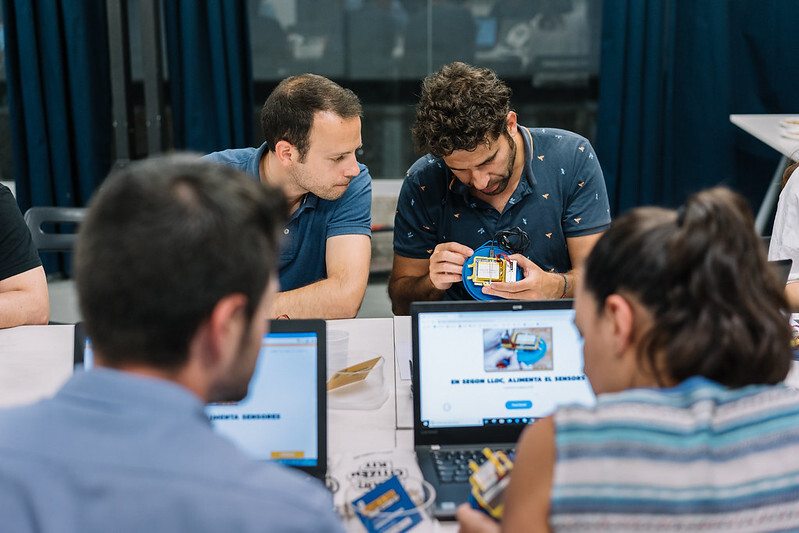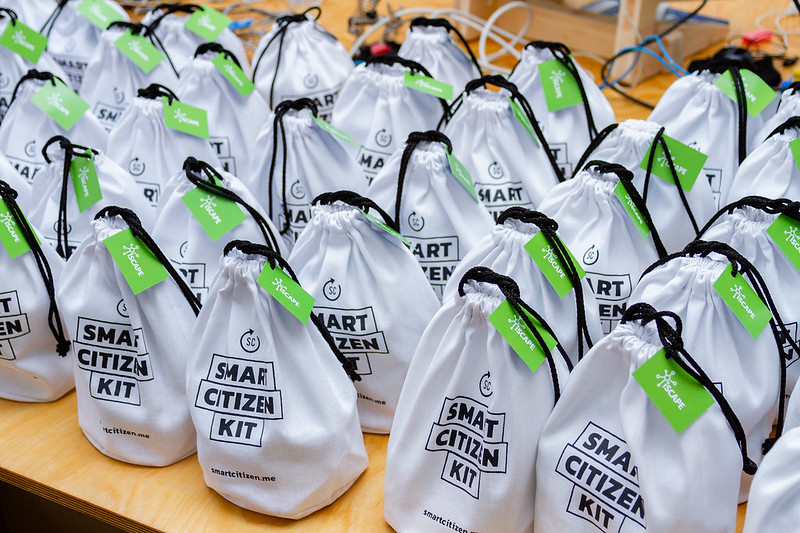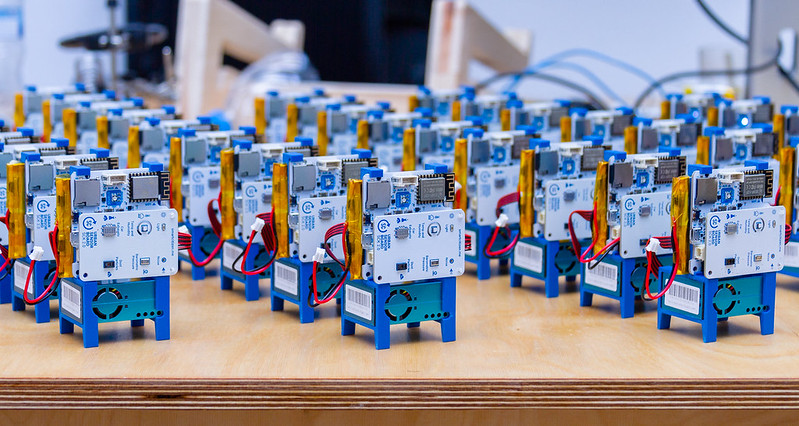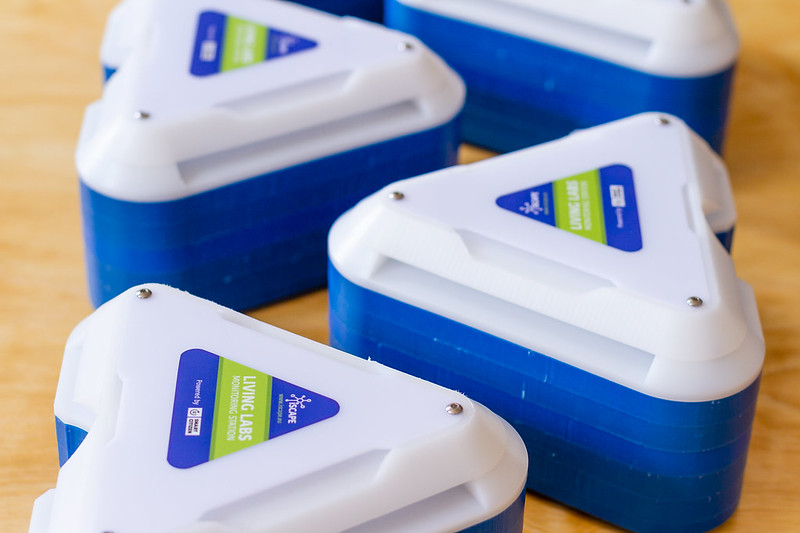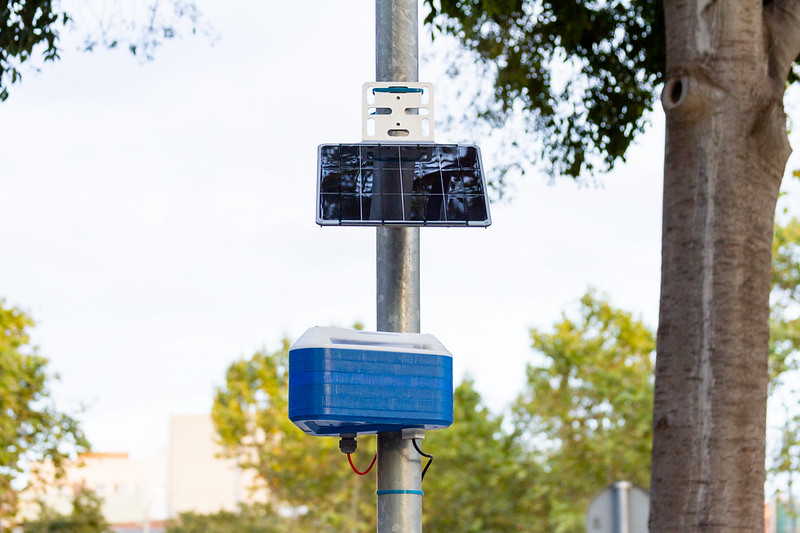
Open source sensor tools to measure air pollution
Empowering citizens to act on data against climate change
Horizon 2020 project, iSCAPE (Improving the Smart Control of Air Pollution in Europe), wrapped up at the closing event in Dublin, Ireland, November 2019. Barcelona, amongst five other European cities, played a key part of the three-year research working on reducing the negative effects of climate change and air pollution through passive control systems, citizen engagement, behavioural change, and low-cost sensors.
The sensors came from iterations of the Smart Citizen Kit, which then powered the Living Lab Stations. Fab Lab Barcelona’s major input came from the development of the hardware, software and contributed to the engagement methodology on participatory sensing that was created during the Making Sense project.
A strategy to reduce and prevent air pollution
Air pollution is one of the largest problems when considering health, contributing to around 9% of deaths globally. This shocking statistic is encouraging many citizens to take action, leading to progressive developments which aim to reduce damagingly high levels of air pollution. Strategies include the creation of low-emission zones in city centres; more efficient methods of resource collection and promoting reduced consumption and also creating awareness.
click to tweetAir pollution contributes to around 9% of deaths globally.
An increase in sensor technologies has enabled measurement of levels of pollution in urban areas, providing concrete numbers that can be used to reinforce the need for policy change towards heavily-polluting procedures. Many of these technologies are, however, closed-source and monetised. iSCAPE differs in this sense, due to its open-source innovations in the field of sensors. The sensors, as part of ‘Passive Control Systems (WP3)’ – are based on a low-cost technology which explores the monitoring of indoor and outdoor environments. Not only are the sensors economical, but the approach is fully open-source – from the hardware to the software.
The role of Smart Citizen, Making Sense and Organicity in the development of iSCAPE
iSCAPE instrumentalised “sustainable and passive air remediation strategies, policy interventions and behavioural change initiatives in order to control air pollution and carbon emissions”. The sensor technology developed for iSCAPE came from Fab Lab Barcelona’s Smart Citizen, EU projects Organicity and Making Sense. The Smart Citizen sensors collect important environmental air quality data which can be accessed via the Smart Citizen platform. Making Sense provided tools for direct citizen engagement through forming partnerships, rather than participation from citizens. Through empowering citizens in the field of urban sensing, citizens can become citizen scientists and crucially, offer the tools to translate surrounding environments into comprehensive data. Continuous citizen engagement in the Making Sense project identified a barrier between citizens and the sensor technology – leading to the developments of the “on-boarding” application. These guidelines for citizen sensing are published in the ‘Citizen Sensing’ toolkit. The open-source nature of the project created a continuous feedback mechanism accessible via the Smart Citizen platform and Github. The Making Sense project led to further iterations of the Smart Citizen Kit, which then powered the Living Labs used in the iSCAPE research.
Living Labs Stations
The Living Labs Stations have a wider functionality than the Smart Citizen Kit. This is due to the two additional pieces of hardware, in the form of sensors, which can be ‘plugged’ into the Smart Citizen expansion port (the Gases Pro Board and the PM board). Again, the citizen science approach aided the development and design of the enclosure for the stations through direct feedback and testing in alternative weather conditions (see image). The Living Labs Stations were sent to all partners of iSCAPE for at least 2.5 months with station location changes. All feedback led to the final iteration of the Living Lab Station. This ability to record and collect data allows communities to address pressing problems in air, water, soil and sound pollution. Other outcomes of iSCAPE included the sensor calibration station, air pollution game, the SCK 2.1 with its outdoor enclosure (see image) and the previously mentioned, Living Lab Stations.
Creating data literacy leads to action
The results of iSCAPE demonstrated how tools can be understood and used at different levels, encapsulating the concept of ‘smart cities’ and sustainable urban development. iSCAPE educated and created literacy about our surrounding environments, providing empowering feedback in the form of live data using reliable sensors. The Smart Citizen Kit is accessible due to its availability to buy commercially with SEEED studio for less than €100, with a complete setup procedure and community platform available for support, documentation and discussion. Only six European cities worked with the Smart Citizen sensors and Living Labs, yet there is a clear need for more engagement from citizens to record sensor data about their own environment. The iSCAPE project data provides vital information for actionable research. The richer the information collected, the better tools, actions and policies can be created to reduce the amount of pollution in our air.
iSCAPE project partners were University College Dublin (IE), Trinity College Dublin (IE), University of Bologna (IT), University of Surrey (UK), Finnish Meteorological Institute (FI), FI Hasselt University (BE), TU Dortmund (DE), EC Joint Research Center (EC), T6 (IT), Pureti (ES), Future Cities Catapult (UK), DCC (IE), Regional Agency for Prevention, Environment and Energy (IT) and European Network of Living Labs (BE). Additional information about iSCAPE can be found on the website and more images of the project here.
Useful links for you to become a citizen scientist
- Read more about iSCAPE, Making Sense and Smart Citizen projects.
- Become a changemaker. Buy the Smart Citizen Kit from SEEED Studio.
